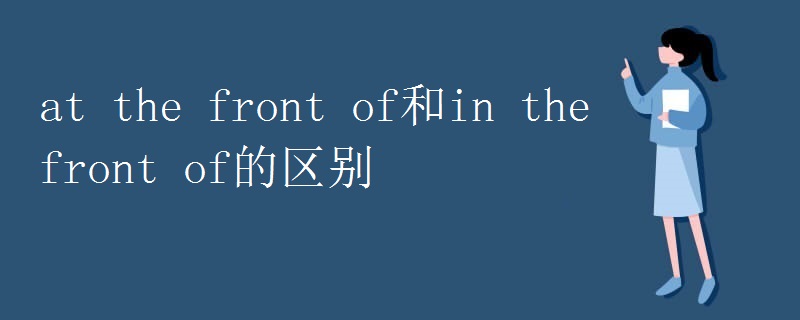at the front of和in the front of的区别
at the front of和in the front of的区别:指代不同、用法不同、侧重点不同。at the front of意为“在…前”,侧重指在前面的某一点上;in the front of意为“前面”,侧重于在外部的前面。

at the front of和in the front of有什么区别
1、具体含义不同
in front of 与 in the front of 用法不同,前者表示“在……前面”,指范围之外的前面;t the front of表示“在……的前部”,指范围之内的前部。比较:
2、用法不同
at the front of 的用法比较广,它不仅兼有以上两个短语的意思和用法,而且还有其他一些用法,如表示前端、开头等意思。
例句:
Manchester United would be at the front of a queue of potential buyers
在众多潜在的买家中,曼彻斯特联队将排在最前列。
There is a table of contents in the front of a dictionary.
词典的开头有目录表。
front的用法介绍
front有多种词性,n.前面;v面对;adj.前面的;adv.在前面,其中,front做名词的用法使用较多,并且可以和介词组合成短语使用。例如:in the front of和in front of都可翻译做“在前面”,但所使用的场景却存在较明显的区别,一起来看看吧!
front of 意为“在前面”,指一个物体位于另一个物体的前方(两个物体相互独立,没有包含关系),例如“小河前面有一栋房屋”等等。
The girl stood in front of an old woman.(两者独立)
那个女孩站在老太太的前面。
Our school is in front of the mall.
我们的学校在那个商场的前面。
the front of 意为“在……的前面、在……前部”,表示一个物体位于另一个物体的前端,即在另一个物体的范围之内,两者为包含关系,例如:“足球位于足球场的前边”。
He sat in the front of the room.
他坐在房间的前面。(在房间内部)
The boy is standing in the front of the bus.
男孩站在公共汽车的前半截车厢。(在车内部)

